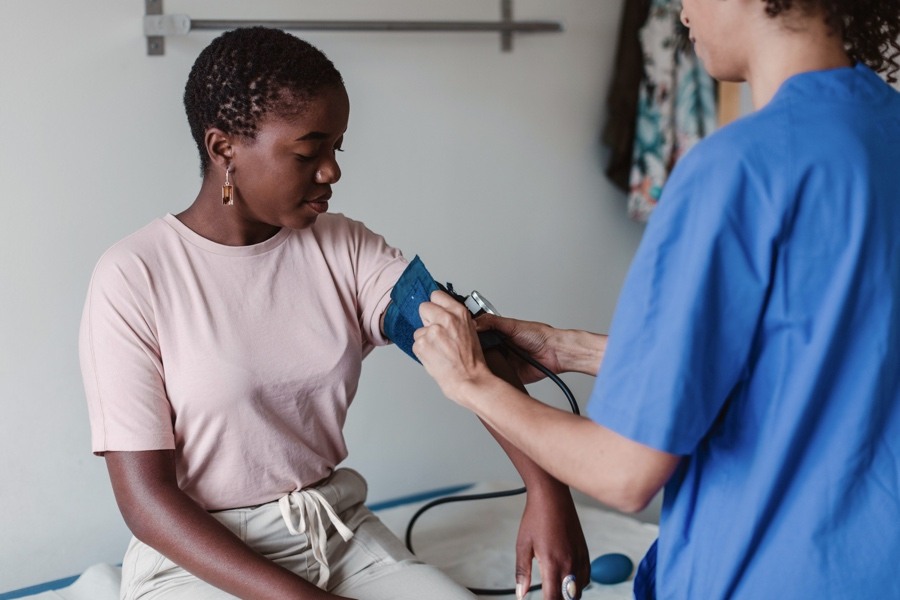Which Doctors’ Appointments Should You Be Keeping Right Now?
In the time of coronavirus, health care must be more adaptable than ever. Here’s what you need to know.

Is it worth leaving home for your doctors’ appointments? We put the question to three Philly doctors. | Photo by Maskot/Getty Images.
Amid all of the COVID-19 medical imperatives, it’s important to also continue to discuss health issues which have nothing to do with the virus. We talked to medical professionals at local hospitals to find out which appointments you should be going in for — and what you can do over video or the phone.
Unsurprisingly, most doctors recommended utilizing telemedicine appointments, so you can talk to your doc but still stay safe and self-isolated. We got expert advice from Dr. Margot Savoy, Chair of Family and Community Medicine at at Temple University, Dr. Judd Hollander, Associate Dean for Strategic Health Initiatives at Thomas Jefferson University, and Dr. David Horowitz, Chief Medical Officer of Clinical Practices of the University of Pennsylvania. Read up on best practices below.
Philadelphia magazine: What advice would you give people on what doctor appointments they should be keeping?
Dr. Horowitz: What we’re asking is that you reach out over the phone or virtually and have that conversation about what you might need as a patient before you go to the doctor. I would hate to give out a laundry list of symptoms, or signs, or conditions, for which an individual might purposely seek out or not seek out medical care. I think it is the dialogue that matters. It’s the conversation with providers to figure out whether or not you need a telephone call, a video visit, or coming to the office.
What about routine check-up appointments?
Dr. Horowitz: Call first. A routine evaluation when someone’s feeling perfectly well is something that you might not need to go to the healthcare provider’s office for right now. We’re anticipating that when this crisis is over, and when things have settled down that we will all be extra specially busy catching up with the routine appointments.
What are examples of something that people might not think they could do a phone or telehealth consultation about?
Dr. Savoy: Things like diabetes, which you would think, “Well, I have to come in and have to get my lab work done.” It’d be great to have you get your lab work done, and I absolutely want to get your A1C. But it isn’t the end of the world to not have it right now. I can wait a couple of months. I can have you check your blood sugar at home, tell me what those numbers are like and then we can decide if you want to adjust your insulin over the telephone. In the future, we should close the loop and get those other tests done, but they don’t have to happen today.
What about someone who twists their ankle or cuts their finger?
Dr Hollander: There are things that definitely need to be taken care of, but don’t need to be taken care of now. For example, if you twist your ankle, we actually know algorithms that give you better than 99% accuracy telling who needs an X-ray. For lacerations, if you cut your finger at two in the morning, that doesn’t mean you need to go get it stitched up at two in the morning. We could tell you how to wash it, how to clean it, how to care for it, and then you can have a more leisurely appointment where you could call ahead to get stitched up later. Then, you know that it’s safe to walk into that office, rather than walking into what in two weeks will be an insanely crowded emergency department with a lot of people with COVID. Sometimes we can get you to a better place of care in a couple hours than having you run to an ER immediately and be exposed to whatever you might be exposed to.
What about chemotherapy and radiation?
Dr. Savoy: If you’re in the middle of chemotherapy, they’re likely going to have you keep coming in. They may adjust some of your regimen depending on exactly what you’re taking. So that you’re not having to come more frequently than you might have otherwise needed. But chemotherapy would still happen. Not just chemotherapy for cancer, but some people are getting chemotherapy for autoimmune diseases and things like that. Some of them might need to still come in because you wouldn’t want them to relapse because they didn’t come in to get their injection on time.
How about post-heart-attack check-ups?
Dr. Hollander: If you have a history of a heart attack, but you’re not having symptoms, you may not need to come in right now. If you’re having acute chest pain, that’s different. If you have a history of heart failure, but you’re well, or a history of asthma, and you don’t have severe symptoms— do those check-ins from home. You can do all those things via telehealth.
Any advice on early prenatal care?
Dr. Savoy: Prenatal care is an interesting one because it’s going to depend on where you are in the pregnancy. If you’re in the beginning of your pregnancy and you’re otherwise doing well, then we don’t necessarily have to see you right at this time. If you’re not bleeding, and you’re not cramping, we can do all that initial prenatal check-ins later when it’s safer for you to be here. I can call in things like prenatal vitamins over the phone, and they could just go pick up from the pharmacy. Things like that initial pap smear and the blood work that you do at the very beginning, we can just wait a little bit later to do that, because I don’t really want you out right now if you don’t need to be.
And how about prenatal care for people who are close to delivering?
Dr. Savoy: Normally, you start bringing people in once a week at this time, and if they’ve got high risk pregnancy, and they come in more often. For those folks, we don’t really have a choice. We have to make sure that we’re keeping you safe. And so in those cases I would still go in for my visit, but I would talk to the doctor first or make sure that if you have the option when you get to the practice. At Temple, what they’ll have you do, everybody gets screened at the entrance of any of the building, and we’re encouraging wearing masks and other protective gear.
Are elective surgeries being put on hold?
Dr. Horowitz: Yes. We have to be prepared for what might be coming. We know with COVID that 80 percent of people will have mild disease, mild symptoms, and of that 20 percent that have more significant symptoms, maybe, only one in 20 would need hospitalizations, about five percent. But if this all becomes a rush, like a tidal wave of activity, we have to have room in the hospitals to accommodate people, we have a rush of patient volume. So those surgeries, which could be safely deferred, the electives, are going to be deferred. And what that does is, that creates capacity. Same with our patient visits in an ambulatory setting. And those folks for whom it’s safe to do a virtual visit, we’re doing that. And what that does is that it creates capacity.
What if someone is not sure if they should go to the ER or urgent care?
Dr. Savoy: ERs and urgent care are where the sick people go. You don’t really want to be where the sick people are right now. If think you’re feeling a little not well, it’s better to feel a little not well at home. Even if you’re not feeling well, unless you genuinely can’t breathe, or you’re having chest pain, or you’re really having a very high fever that you can’t bring down with Tylenol at home, I would not send my family member into the hospital unless I really needed to.
What about diagnosing COVID-19?
Dr. Hollander: Just recently somebody published that in assessing how short of breath somebody is, you can just make them take a deep breath and then count as far as they could count and what number they get up to and how long in seconds before their next breath predicts what their oxygen saturations are, with pretty good sensitivity and specificity. So we’ve started doing that sometimes on telehealth. And in fact, one person the other day, didn’t count far enough. And they had COVID and they went to the hospital because they couldn’t count far enough and they got admitted to the hospital. And in fact, they had pneumonia on their X-ray. When you do more telemedicine, you start finding these little tricks that you can utilize that may not be perfect, but they’re pretty good.
To learn more about telemedicine, check out our handy guide: How to Make a Telemedicine Appointment and Other FAQs.
Want to hear more from us? Join Be Well Philly at:
FACEBOOK | INSTAGRAM | NEWSLETTER | TWITTER


